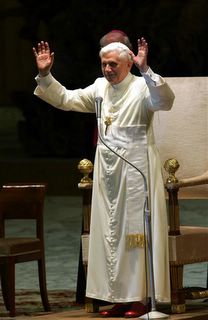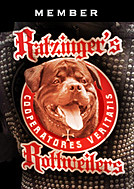The Pugil Stick
"Quot capita, tot sententiae"
Thursday, April 28, 2005
Saturday, April 23, 2005
We Are Safe Now
Many devout Catholics breathed a sigh of relief (if they didn't jump for joy) when the name of the new Pope was announced. "We are safe now", many said to each other. We knew that Pope Benedict is a holy, orthodox, brave man. We knew that he will not falter or waver when proclaiming the Truth. He is a reserved man; he has not the ebullience of John Paul II. He is a studious man; he has not the magnetism of his predecessor. But he has suffered. He has sacrificed.
He was coerced into joining Hitler's Youth Program at the age of 14. For those who don't realize it, it was MANDATORY for all German youths to do so; refusal meant penalty of death. Later when he was drafted he deserted and was subsequently interned as a POW under the American army. His early suffering was different from John Paul II's. Karol Wojtyla endured an occupation and brutality from an outside invader. Joseph Ratzinger endured hostility and coercion from his own people. It must be very disturbing, to witness and be forced to partake of that which deviates from one's own culture and principles - to see your own people go astray from the right path.
And that is what Pope Benedict recognizes and sees in Europe, particularly western Europe. It is no coincidence that he chose the name "Benedict" for his pontificate. St. Benedict is the Father of Western Monasticism. After the fall of the Roman Empire, Europe descended into chaos and anarchy. All of civilized man's works: literature, government, art, etc... were in peril. It is Benedict of Nursia who retreated and created monastaries where his followers could pray, study, and preserve all that was good culture from the ancient worlds. He developed a set of Rules, on which much civil and religious government are based.
Pope Benedict sees a direct correlation between Europe's decline into a coarser society and its rejection of Christianity. A man of deep insight, he recognizes the dangers which face the Church today - especially "relativism"- about which he preached in his homily for the Mass on the eve of the Conclave. He has faced fierce criticism and hostility from the left and the media alike for his unvarnished statements about abortion, homosexuality, birth control, etc... Under Pope John Paul, he has taken many bullets as the Prefect of the Congregation for the Doctrine of the Faith.
He has expressed a desire to retire many times, but Pope John Paul would not allow it. In an interview conducted last year, Cardinal Ratzinger wryly commented that he could not retire in good conscience when he was seeing how the Holy Father continued his pontificate in suffering and ill health.
A literate man, who also enjoys playing piano and listening to Mozart, he has written many theological works including a memoir. The name, "Benedict", Latin for "good words" is doubly appropriate for this man of faith. Those who know him or have met him have consistently commented on his courtesy, his humility, and his gentleness.
Catholic youth have embraced John Paul, and the world was astonished when they saw the hordes of young people crowd St. Peter's Square to see his body lie in state before the funeral. When the new Pope was proclaimed, they chanted his name "Benedict" and cried with joy. This generation of youth is the first to have grown up without a father. Children out of wedlock, broken marriages - the result of the 60's ideologies - they embraced the Pope as a father figure. They want someone who stands for something. They want someone who will tell them the Truth without whitewashing, without politically correct language. They want someone who will love them and tell them what is good and right, like a true father would.
In Pope Benedict XVI, they have been granted their wish.
Friday, April 08, 2005
Some Got it Right; Many Got it Wrong
The intensive media coverage of the death of Pope John Paul II sometimes gratified me, and often frustrated me.
Some got it right: the Pope was an unwavering beacon of Christian truth in the face of current postmodern popular wisdom. His adherence to the Doctrine of the Faith challenged the direction Western society has taken in many controversial issues: abortion, contraception, marriage, euthanasia, war, death penalty and economics to name a few. John Paul II was one of the key figures who helped bring the end of Communism in Eastern Europe, along with Margaret Thatcher and Ronald Reagan. And in the end the aged and ailing Pontiff also taught the world the value of suffering and the dignity of the human person no matter what the circumstance of health. Some pundits touched upon these points and rightly so.
Many got it wrong: some of the talking heads, especially those in the United States pondered the direction of the Roman Catholic Church after a new pontiff is elected. They discussed the possibility of "bridging" the gap between those Catholics who support gay marriage, abortion and contraception with those who stand by the current Church doctrine of a Culture of Life. On Scarborough Country, Pat Buchanan correctly assessed that those bridges can never be established. He said that morality could never be compromised with immorality. Unfortunately, a Jesuit priest on the show (who is an editor of the left wing "America" journal) contradicted Mr. Buchanan with bland statements of "developing" doctrine. He used the example of the changes in liturgy to prove his point. What he failed to do was realize that morality and liturgy are two completely different things. It may become acceptable to receive Holy Communion in the hand, but it will never become acceptable to murder an unborn baby. It was a woeful example of how so many of the Catholic clergy in America have strayed from the Church and have confused the masses.
In stark contrast to the confusing and contradictory statements made by the American media, EWTN's commentary never wavered from the teachings of the Church and this Pope. There was no disingenuous attempt to adulterate or dilute the truth of faith and morals. There were no musings of the possibility of female priests, a married priesthood, the acceptance of contraception, etc... because EWTN broadcasted the properly catechized position of the Church.
The Catholic Church in America (and it's NOT the "American Catholic Church") has miserably failed to catechize the faithful; indeed, many of the clergy are misleading the flock with bad theology and morality. I can chuckle at a secular reporter who mistakenly refers to an icon of Our Lady of Grace as a "picture of Jesus", but I cannot laugh when a Roman Catholic priest deliberately obscures or twists a doctrine of the Church for his own liberal agenda.
The Church needs prayers. We need prayers to the Holy Spirit to send us another good Pope who will guide her in these uncertain times with the same devotion and energy that John Paul the Great exemplified.
Saturday, April 02, 2005
"I have looked for you, and now you have come for me..."
Those were the words of the Pope as he lay dying. He was told of the many young people who crowd St. Peter's Square waiting to hear news of him. They are poignant words, spoken by a man who spent most of his life seeking out people to hear the Good News of Christ. Indeed, those words could be applied to John Paul's impending meeting with his Maker - for he has looked for Christ in everyone he met.
It is an interesting juxtaposition, the impending peaceful death of this beloved Pontiff, to the strife which accompanied the death of Terri Schiavo. Yet I do not think it is a coincidence that we would see his passing so soon after hers. After all, he was the most outspoken public figure in defense of the helpless, the marginalized, the abandoned.
The world will feel a sense of loss when this man, one of the greatest of the 20th century, passes away. Prolific writer, poet, playwright, traveller, linguist, philosopher, mystic, sportsman, statesman, he was truly a Renaissance man. Already towards the end of his pontificate he was being called "John Paul the Great", and some believe that he will be canonized someday. It would be a fitting culmination for this holy man, who canonized more saints than any other, to be finally proclaimed one after he attains his well-deserved place in God's presence.
















